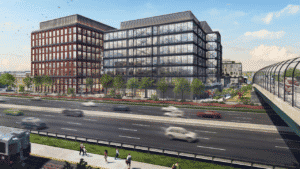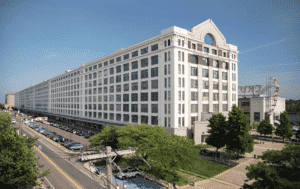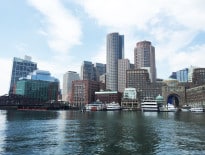If 2020 was any guide, the year of the pandemic served up a reminder of how the unexpected can sort out demand between sought-after and shunned commercial real estate locations and property types.
With ample capital available for investment opportunities in 2021, Boston-area developers have resumed a busy pace of acquisitions and proposals tying into the region’s thriving biopharmaceutical industry and demand for multifamily housing. While the pandemic temporarily halted construction, work resumed at large office tower construction sites, but with new uncertainties about the prospects for securing tenants.
Shot in the Arm for Office Space?
Greater Boston’s 181 million-square-foot office market approaches a post-COVID crossroads.
Landlords are looking ahead to mid-2021 for clarity on businesses’ future real estate plans, after COVID-19 virtually halted new office leasing beginning in late winter. Companies shifting to work-from-home models made 3.8 million square feet of office space available for sublease in Boston’s central business district, or 5.7 percent of the overall inventory, according to Newmark Knight Frank research. Cambridge’s pricey office market has 1 million square feet of sublease space of its own, equating to 10 percent of the market.
Across the entire Greater Boston office market, vacancies rose by 1.2 percent during the third quarter, the largest spike in 15 years.
The disruption to traditional work arrangements comes as downtown Boston’s office construction is hitting a 20-year peak, with 5 million square feet being built. HYM Investment Group’s 1 million-square-foot One Congress, scheduled to open in 2023, is the largest office tower built in Boston since 2000, and is seeking tenants for 500,000 square feet of space to join anchor tenant State Street Corp.
With the vaccination rollout off to an uneven start, it’s unclear if and when companies will consider a return to pre-pandemic work arrangements.
“We feel 2021 is going to see improvement, but it may not be until the middle of the year,” said Doug Manz, HYM’s director of development. “Companies are trying to figure out what they need for office space, and the sublease market is an indicator of that. Our perspective is with the vaccine being rolled out, people are going to be itching to get back.”
Manz acknowledged that many companies are likely to offer flexible work arrangements post-COVID, which could depress space requirements, while seeking more square–footage per employee, reversing the office densification trend of the past decade.
HYM has more flexibility for the commercial portion of its 16.5 million-square-foot Suffolk Downs redevelopment, where the first phase of construction is expected to begin in mid-2021. The commercial buildings will have floor plates ranging from 35,000 to 50,000 square feet, suitable for lab tenants who have continued to seek expansion during the pandemic.
Major office projects under construction in Boston without lease commitments include Millennium Partners’ Winthrop Center skyscraper, which includes 772,000 square feet of office space, and Hines’ 2.7 million-square-foot South Station air rights project, which will include 768,000 square feet of office space in the initial phase.

A long-dormant parcel at 176 Lincoln St. in Allston is in play for a large redevelopment including office-lab space and 314 apartments. Image courtesy of CBT Architects
A Changing View from the Mass Pike
The view from the Massachusetts Turnpike is changing rapidly from Back Bay to Allston, including a procession of redevelopments near the three-year-old Boston Landing MBTA commuter rail station.
NB Development’s construction of the new station – which delivers riders to South Station in 14 minutes – has catalyzed a series of multifamily and office projects on nearby parcels. The Blank family, longtime owners of a 133,895-square-foot office building at 119 Braintree St., began reviewing redevelopment options as plans for the commuter rail station materialized.
“We knew that once the train station was built, we were in an unusually fortuitous position, because we’re right on top of the station,” said Braintree Street Realty’s Michael Blank, whose property is steps from the boarding platform. “And we saw an opportunity to reposition ourselves in the marketplace.”
The project will replace the office building – originally the Arthur Blank & Co. headquarters, and later converted into multitenant space in the 1980s – with a new 395,250-square-foot office-lab building, while a 97-unit multifamily building would replace a one-story gym and parking lot. The residential portion could include 100 percent income restricted units, Blank said, reflecting a desire to ease displacement pressures in the neighborhood.
Across the highway, Harvard University moved forward with its vision for a long-uncompleted project on a Lincoln Street property that it’s owned for 14 years. The university, in partnership with Boston-based Berkeley Investments, proposes 548,000 square feet of office-lab space and 314 apartments.
Allston’s large-scale development proposals aren’t limited to the Mass. Pike corridor, as firms acquire sites off Soldiers Field Road and Western Avenue while the Boston Planning and Development Agency continues a planning study on higher-density zoning.
Harvard selected New York developer Tishman Speyer to lead its latest Allston expansion, including a 900,000-square-foot office-lab building and hotel on a 14-acre parcel on Western Avenue. And The Davis Cos. of Boston is seeking to build a 535 apartments, 120 condominiums and a 225-room hotel on two neighboring Soldiers Field Road parcels: the former Skating Club of Boston property and Studio Allston hotel.
Public Dispositions, Private Opportunities
Surplus property dispositions by state agencies are laying the groundwork for transformative redevelopments of properties in Dorchester and West End.
Accordia Partners is seeking approval to reshape 34 acres in Dorchester into a new commercial and multifamily complex called Dorchester Bay City, while suggesting some of the most aggressive affordable housing strategies in a large-scale for-profit development. Accordia and its partner Ares Management have proposed reserving 15 percent of the 1,740 housing units as income-restricted units on the former Bayside Expo Center and 2 Morrissey Blvd. properties, and paying $10 million toward first-time homebuyer programs to limit displacement.

Development in the Seaport District is spilling into the neighboring industrial areas to the east. The 1.4 million-square-foot Innovation and Design Building could get lab space under a proposal from owners Jamestown and Related Beal. Photo courtesy of Jamestown
Plans to sell the Hynes Convention Center property in Back Bay were delayed pending approval by the state legislature, but Gov. Charlie Baker rolled out another prime parcel in Boston’s West End as the state seeks a private redevelopment partner to ground-lease the Charles F. Hurley state office building at 19 Staniford St. A request for proposals is scheduled to be issued in early 2021 for the redevelopment, which could include a 400-foot-tall high-rise, and developers would be required to set aside up to 350,000 square feet of office space for state agencies.
And in Downtown Crossing, the city of Boston is seeking proposals to buy the Lafayette parking garage, with proceeds going toward public housing and affordable housing projects. Additional development on the 3.6-acre property would be contingent upon negotiating air rights with neighboring property owners, however.
Rising Tide of Development in Marine Park
Following the rapid development of the Seaport District and a series of acquisitions along the A Street corridor, commercial developers are competing to acquire properties in the industrial eastern end of the neighborhood for office and lab projects.
Innovation and Design Building owner Jamestown brought on Boston-based Related Beal as a partner with plans to add more office and lab space in the existing 1.4 million-square-foot complex.
Boston-based Davis Cos. is proposing to nearly double the size of the 88 Black Falcon complex, and Marcus Partners seeks to demolish the Au Bon Pain headquarters and bakery for a 228,000-square-foot office-lab complex.
Millennium Partners received approval for its 380,000-square-foot Innovation Campus, a 380,000-square-foot office-lab complex on 4.4 acres at 2 Harbor St.

Steve Adams
Will Hub-and-Spoke Gain Traction?
Subleasing activity has been comparatively restrained in the suburbs in 2020, but the pandemic’s effects on public transit ridership have prompted speculation that companies will adopt “hub-and-spoke” operations including both downtown and suburban offices. Local brokerages say there’s been little evidence of an outmigration pattern so far.
The larger factor has been lingering big blocks of vacant space left behind by downsizing and relocating companies including Computershare, Oracle, Phillips and Puma, at a time when suburban vacancies are at an eight-year high of 16.4 percent, according to Colliers International research.
Office space blocks exceeding 100,000 square feet account for 28 percent of suburban vacancies, according to Colliers, but only two companies have space requirements in that size category: ZoomInfo and Translate Bio.




 |
| 

